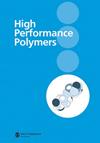Preparation of halogen-free flame retardant curing agent and its application in epoxy resin
IF 1.6
4区 化学
Q3 POLYMER SCIENCE
引用次数: 0
Abstract
9,10-Dihydro-9-oxa-10-phosphaphenanthrene-10-oxide-N-Aminoethylpiperazine (DOPO-AEP), a phosphorus and nitrogen intumescent flame retardant curing agent was prepared by using acetonitrile as solvent using 9,10-dihydro-9-oxa-10-phosphaphenanthrene-10-oxide (DOPO) and N-aminoethylpiperazine (AEP) as raw materials. The structure of the flame retardant curing agent DOPO-AEP was analyzed Fourier Transform Infrared Spectrometer (FTIR), Nuclear Magnetic Resonance (NMR) and Electrospray Ionization Mass Spectrometry (ESI-MS), and the synthesis method of the target product was determined. In addition, the content of char residue was determined by thermogravimetric analyzer, and its thermal properties were comprehensively explored, and based on the obtained results, the curable epoxy resin was selected to prepare DOPO-AEP/EP flame retardant composites. According to the amount of DOPO-AEP added product, different proportions of DOPO-AEP/EP flame retardant composites were prepared, and the actual impact of flame retardant properties and mechanical properties of epoxy resin in different proportions was explored. When the content of DOPO-AEP is 35%, the limiting oxygen index of DOPO-AEP/EP reaches 29.9, which has a significant increase compared with the limiting oxygen index of pure epoxy resin of 19.8, but compared with the content of DOPO-AEP of 30%, the limiting oxygen index of DOPO-AEP/EP is 28.7, and there is no significant increase change. Comprehensive analysis shows that when the component content of DOPO-AEP is 30%, the flame retardant system has a tensile strength of 29.0 MPa, an impact strength of 4.5Kj/m无卤阻燃固化剂的制备及其在环氧树脂中的应用
以9,10-二氢-9-氧杂-10-磷菲-10-氧化物(DOPO)和N-氨乙基哌嗪(AEP)为原料,以乙腈为溶剂,制备了磷氮膨胀型阻燃固化剂9,10-二氢-9-氧杂-10-磷菲-10-氧化物(DOPO)和N-氨乙基哌嗪(AEP)。对阻燃固化剂 DOPO-AEP 的结构进行了傅立叶变换红外光谱(FTIR)、核磁共振(NMR)和电喷雾离子化质谱(ESI-MS)分析,并确定了目标产物的合成方法。此外,还利用热重分析仪测定了炭渣的含量,并对其热性能进行了综合探讨,根据所得结果选择了可固化环氧树脂制备 DOPO-AEP/EP 阻燃复合材料。根据 DOPO-AEP 的添加量,制备了不同比例的 DOPO-AEP/EP 阻燃复合材料,并探讨了不同比例的 DOPO-AEP/EP 对环氧树脂阻燃性能和力学性能的实际影响。当 DOPO-AEP 含量为 35% 时,DOPO-AEP/EP 的极限氧指数达到 29.9,与纯环氧树脂的极限氧指数 19.8 相比有明显提高,但与 DOPO-AEP 含量为 30% 时相比,DOPO-AEP/EP 的极限氧指数为 28.7,没有明显的提高变化。综合分析表明,当 DOPO-AEP 的组分含量为 30% 时,阻燃体系的拉伸强度为 29.0 MPa,冲击强度为 4.5Kj/m2,弯曲强度为 73.9 MPa,极限氧指数高达 28.7,体系的综合性能最好。通过扫描电镜检测燃烧后阻燃复合材料的表面形貌,发现环氧树脂固化炭渣表面形成致密炭层,发泡明显,表明 DOPO-AEP 的阻燃固化性能良好。
本文章由计算机程序翻译,如有差异,请以英文原文为准。
求助全文
约1分钟内获得全文
求助全文
来源期刊

High Performance Polymers
化学-高分子科学
CiteScore
4.20
自引率
14.30%
发文量
106
审稿时长
1.2 months
期刊介绍:
Health Services Management Research (HSMR) is an authoritative international peer-reviewed journal which publishes theoretically and empirically rigorous research on questions of enduring interest to health-care organizations and systems throughout the world. Examining the real issues confronting health services management, it provides an independent view and cutting edge evidence-based research to guide policy-making and management decision-making. HSMR aims to be a forum serving an international community of academics and researchers on the one hand and healthcare managers, executives, policymakers and clinicians and all health professionals on the other. HSMR wants to make a substantial contribution to both research and managerial practice, with particular emphasis placed on publishing studies which offer actionable findings and on promoting knowledge mobilisation toward theoretical advances. All papers are expected to be of interest and relevance to an international audience. HSMR aims at enhance communication between academics and practitioners concerned with developing, implementing, and analysing health management issues, reforms and innovations primarily in European health systems and in all countries with developed health systems. Papers can report research undertaken in a single country, but they need to locate and explain their findings in an international context, and in international literature.
 求助内容:
求助内容: 应助结果提醒方式:
应助结果提醒方式:


